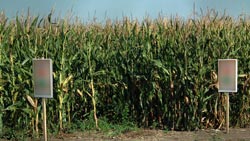A European-wide network for systematic GMO impact assessment

GMO maize field between Timisoara (Timisoara) and Sannicolau Mare in Romania. The plains of the Banat is used for agriculture for centuries - for several years in the Romanian part for field trials with GMO plants. (The signs were obscured for privacy.)<br>photo: Tilo Arnhold/UFZ<br>
In Europe there are many concerns about adverse environmental effects of GM crops, and the opinions on the outcomes of environmental risk assessments (ERA) differ largely. GM crop safety testing and introduction studies among the regulatory system are insufficiently developed. Therefore the proposed framework aims at improving the regulatory system.
Specific elements of the network are a) methodologies for both indicator and field site selection for GM crop ERA and PMEM, b) an EU-wide typology of agro-environments, c) a pan-European field testing network using GM crops, d) specific hypotheses on GM crop effects, and e) state-of-the art sampling, statistics and modelling approaches.
Involving actors from various sectors the network will address public concerns and create confidence in the ENSyGMO results, write a team of scientists in the open access journal “BioRisk”.
Publication:
Graef F, Römbke J, Binimelis R, Myhr AI, Hilbeck A, Breckling B, Dalgaard T, Stachow U, Catacora-Vargas G, Bøhn T, Quist D, Darvas B, Dudel G, Oehen B, Meyer H, Henle K, Wynne B, Metzger MJ, Knäbe S, Settele J, Székács A, Wurbs A, Bernard J, Murphy-Bokern D, Buiatti M, Giovannetti M, Debeljak M, Andersen E, Paetz A, Dzeroski S, Tappeser B, van Gestel CAM, Wosniok W, Séralini G-E, Aslaksen I, Pesch R, Maly S, Werner A (2012): A framework for a European network for a systematic environmental impact assessment of genetically modified organisms (GMO). BioRisk 7: 73–97. doi: 10.3897/biorisk.7.1969
http://www.pensoft.net/journals/biorisk/article/1969/abstract/a-framework-for-a-european-network-for-a-systematic-environmental-impact-assessment-of-genetically-modified-organisms-gm
The research was supported by the Federal Ministry of Food, Agriculture and Consumer Protection (BMELV) and the Ministry of Infrastructure and Agriculture of the State of Brandenburg.
Information:
Dr. Frieder Graef
Leibniz Centre for Agricultural Landscape Research, Institute of Land Use Systems (ZALF)
Phone: 033432-82-162
http://www.zalf.de/de/forschung/institute/lse/mitarbeiter/graef/Seiten/
default.aspx
sowie u.a.
PD Dr. Klaus Henle
Helmholtz Centre for Environmental Research (UFZ)
Phone: 0341-235-1270
http://www.ufz.de/index.php?en=1868
or via
Tilo Arnhold (UFZ press office)
Phone: 0341-235-1635
http://www.ufz.de/index.php?en=640
Links:
EU regulation for GMO:
http://ec.europa.eu/food/plant/gmo/index_en.htm
http://ec.europa.eu/food/plant/gmo/authorisation/index_en.htm
http://ec.europa.eu/food/plant/gmo/monitoring/index_en.htm
At the Helmholtz Centre for Environmental Research (UFZ) scientists are researching the causes and consequences of far-reaching changes to the environment. They are concerned with water resources, biological diversity, the consequences of climate change and adaptability, environmental and biotechnologies, bioenergy, the behaviour of chemicals in the environment, their effect on health, modelling and social science issues. Their guiding theme: Our research contributes to the sustainable use of natural resources and helps to secure this basis for life over the long term under the effects of global change. The UFZ employs 1,000 people in Leipzig, Halle and Magdeburg. It is financed by the federal government and the federal states of Saxony and Saxony-Anhalt.
http://www.ufz.de/
The Helmholtz Association contributes towards solving major and pressing social, scientific and economic issues with scientific excellence in six research areas: Energy, Earth and Environment, Health, Key Technologies, Structure of Matter, Aeronautics, Aerospace and Transport. The Helmholtz Association is Germany’s largest scientific organisation with over 33,000 employees in 18 research centres and an annual budget of approximately 3.4 billion euros. Its work stands in the tradition of the naturalist Hermann von Helmholtz (1821-1894).
http://www.helmholtz.de
Media Contact
More Information:
http://www.ufz.de/index.php?en=30901All latest news from the category: Agricultural and Forestry Science
Newest articles

Magnetic tornado is stirring up the haze at Jupiter’s poles
Unusual magnetically driven vortices may be generating Earth-size concentrations of hydrocarbon haze. While Jupiter’s Great Red Spot has been a constant feature of the planet for centuries, University of California,…

Cause of common cancer immunotherapy side effect s
New insights into how checkpoint inhibitors affect the immune system could improve cancer treatment. A multinational collaboration co-led by the Garvan Institute of Medical Research has uncovered a potential explanation…

New tool makes quick health, environmental monitoring possible
University of Wisconsin–Madison biochemists have developed a new, efficient method that may give first responders, environmental monitoring groups, or even you, the ability to quickly detect harmful and health-relevant substances…



